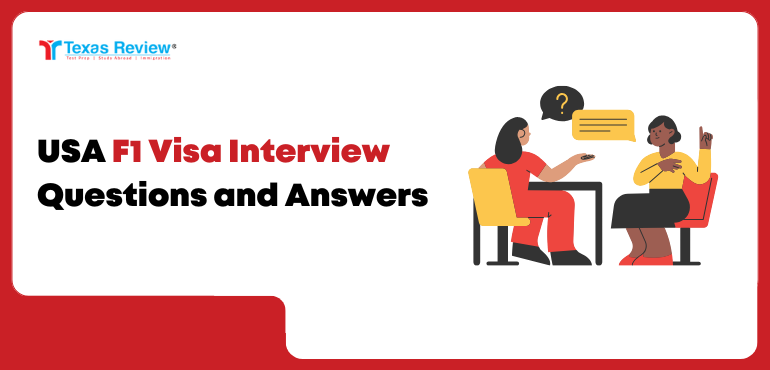
If studying in the USA is your goal, obtaining a student visa is the most crucial step in determining your eligibility, where questions are framed to judge your motivation, economic means, and study plans. This comprehensive coverage will make your task easier by supplying you with all the vital questions, standard responses, and the best approaches to adopt.
Why is the Student Visa Interview Important?
The USA F1 visa interview is a crucial part of securing your visa. The Visa Officer will assess your application during the interview based on various factors.
How to Prepare for the Interview
The student visa interview checks your academic background, reasons for choosing the USA, financial ability, and post-study plans.
- Genuine Student Intent: This ensures that you are a genuine student who wants to leave the place after finishing your studies.
- Academic qualifications and study plan: Inquire about your graduation and its relevance to your future career.
- Financial stability: Ensuring you have enough money to support your educational and living costs.
- Ties to your home country: A check to verify that you have strong ties to your home country to come back after your graduation.
To stand a better chance of approval, you should follow these main steps:
- Scan the available information to ensure the university’s well-founded nature and chosen course.
- Include clear details about money problems concerning the scholarship needed to help you.
- Prepare thoughtful questions and well-crafted answers for the interview.
- Do not be uncertain or dishonest during the conversation.
Organize all your documents, including the certified proof of funds, university acceptance letters, non-academic qualifications, and academic transcripts.
Common Questions Asked in USA F1 Visa Interview
1. Why did you choose to study in the USA over other countries?
This question serves as a test of your decision-making ability and your preference for the USA. A standard example:
“The USA is a worldwide education authority that provides students with the most sought-after degrees, thorough research programs that help them acquire strong knowledge and skills, and the assurance of diversity, safety, and practical training opportunities. Compared to other countries, the USA has better post-study work possibilities and the most outstanding education quality.”
2. Why did you choose this university?
Prove to the interviewer that you have decided to work at the university:
“This university has a longstanding reputation in the fields of art and design. High-quality teachers, the leading research institutions, and the industry connections made by academic and career goals possible. I was impressed to learn that this university ranks among the top in the country and has partnerships with the best businesses in the field.”
Alternative Response:
“I chose this university because it offers a strong program in my field, supported by experienced faculty and a focused, small-scale learning environment. The university’s commitment to academic excellence, research opportunities, and industry partnerships aligns perfectly with my career goals, making it the ideal place for my studies.”
3. What are your plans after completing your studies in the USA?
This item is designed to check if you will return home or stay in the USA.
“My dream is to understand real-world problems and challenges while gaining experience in my field of study. After completing my studies, I plan to return to my country and apply the skills I have acquired in my job. I aim to work in regions where leading brands are primarily located.”
4. Will you live in the USA after your course ends?
You should be true and in accord with the visa rules:
“I am primarily focused on the next steps of my educational journey. If the regulations permit, I may take on short-term work. However, my main long-term goal is to return to my home country to develop my career.”
5. How do you plan to fund your education and living expenses?
This is a very important question to be answered as it decides your financial status:
“My parents are my primary financial supporters, and we have sufficient funds to cover my education and living expenses. We have submitted bank statements and other financial documentation to confirm our ability to pay all costs. Additionally, the university has awarded me a partial scholarship, which will significantly assist with my tuition fees.”
6. Do you have any relatives living in the USA?
Be honest:
“Yes, I have a relative in the US. But, I will be on my own, and studies will be my main focus. I will not be a financial burden for him during my stay.”
7. What will you do if your visa is rejected?
Your readiness is tested here:
“If my visa is denied, then I will review the reasons and correct the mistakes that led to the rejection and I will then reapply with a stronger application. There are no doubts about compliance with all requirements but in case of need, the corrective steps will be taken.”
8. What is your family’s source of income?
The Visa Officer wants to know how financially strong your family is:
“My father owns a business, and my mother works for the government. They live together and earn more than enough to cover their living expenses and pay for my education. The documents attached to my applications also confirm our financial stability.”
9. Where is your university located? What do you know about the region?
Display your knowledge of where you will attend:
“This university is in a student-friendly city. The city has a great public transportation system, is rich in culture, and has a variety of academic and professional opportunities for students.”
10. What are your test scores, and how do they reflect your academic capability?
Confess your scores:
“I scored 320 in GRE and 8.0 in IELTS, which indicates my command of the English language. Furthermore, my academic track record displays a GPA of 3.8, demonstrating my success in higher education.”
Do’s and Don’ts for the US F1 Visa Interview
Do’s:
- Dress professionally in formal attire.
- Maintain a polite and confident tone while speaking.
- Provide concise and direct answers.
- Make eye contact and engage with the interviewer.
- Carry all relevant documents, even if they are not requested.
Don’ts:
- Do not memorize answers; be natural and conversational.
- Avoid providing excessive or unnecessary details.
- Do not be nervous or hesitant while answering.
- Do not give misleading or dishonest responses.
- Avoid arguing with or interrupting the Visa Officer.
Conclusion
A USA F-1 visa interview is a necessary step in acquiring the visa. To improve your chances of approval, provide well-thought-out answers to the questions, compose a strong personal statement, and demonstrate confidence during the interview. Be serious, honest, and convey your dedication to your academic and career goals. Good luck with your interview!














